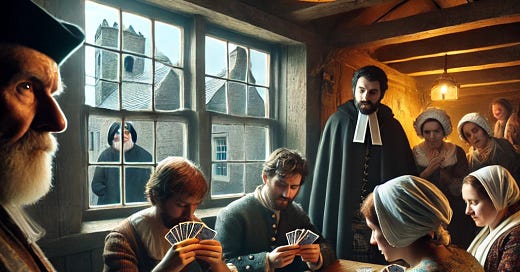Card Games and Onion-Picking: The Unexpected Sins of 17th-Century Scotland
The Unexpected Sins of 17th-Century Scotland
When we think of serious crimes in history, we imagine theft, murder, or treason. But in 17th-century Scotland, particularly in the town of Culross, some of the most punishable offenses included playing cards on a Sunday and picking onions from the garden. While these acts may seem harmless today, they were considered significant breaches of religious and social order at the time. The kirk-session records from Culross (1650s) reveal a world where church elders closely monitored daily life, ensuring that every person adhered to strict Presbyterian discipline.
The Kirk-Session: Scotland’s Moral Police
The kirk-session was the governing body of the local Presbyterian church, responsible not only for religious matters but also for enforcing moral behavior. In a period where church and state were deeply intertwined, the kirk-session had considerable power to punish individuals for behaviors seen as ungodly or disruptive to the social order. Elders patrolled the streets, reported misbehavior, and summoned offenders to answer for their actions.
Every aspect of daily life was under scrutiny. People were punished for missing church, gossiping, drinking too much, or using “strange oaths.” Women who kept company with Cromwell’s soldiers were interrogated, and even children faced consequences for running around after Sunday services. The kirk-session’s records provide a fascinating window into the strict and sometimes absurd rules that governed 17th-century Scottish society.
The Sin of Playing Cards on the Sabbath
On July 12, 1653, four men—John Gray, Gilbert Miller, James Anderson, and David Gray—were caught playing cards after Sunday church service. When summoned to the kirk-session, they confessed their “faults” while kneeling and weeping, promising never to do it again. Rather than being punished severely, they were given a warning: if they were caught playing cards on the Sabbath again, they would have to do public penance in front of the entire congregation.
This incident highlights how seriously the Sabbath was taken in 17th-century Scotland. It was a day reserved strictly for worship and reflection, and any form of leisure or entertainment was seen as disrespectful to God. Playing games, even something as simple as a card match, was considered a direct violation of religious law.
At the time, there was a strong belief that Scotland’s troubles—including war, famine, and disease—were divine punishments for the people's sins. Therefore, enforcing strict observance of the Sabbath was seen as a way to protect the town from God’s wrath.
Pulling Onions: A Scandalous Offense
Another unexpected "crime" recorded in Culross was picking onions on the Sabbath. On July 19, 1653, a woman named Janet Cunningham was accused of pulling “sybows” (the Scots word for green onions or spring onions) on a Sunday. She denied the accusation and was called back the following week to be confronted by a witness. After a few more hearings, she was ultimately “sharply rebuked” by the kirk-session.
Why was pulling onions such a serious offense? In the rigid religious mindset of the time, any form of labor on the Sabbath—no matter how small—was forbidden. Just as playing cards was a sinful distraction, harvesting food (even for immediate use) was considered a violation of God's command to rest.
This level of control over personal behavior extended beyond work and leisure. The kirk-session monitored people's movements, forbade unnecessary travel, and even intervened in family matters. In one case, a man was summoned because his children had been seen playing outside after church, and he was warned to keep them indoors or face punishment.
Public Shame as a Punishment
For minor offenses, like card-playing or onion-picking, the usual punishment was public rebuke—meaning the offender had to stand before the congregation and admit their wrongdoing. In more severe cases, individuals had to wear sackcloth, a symbol of repentance, and publicly atone for their sins.
The idea behind these punishments was to maintain a society that was morally pure and obedient to God. The church believed that setting an example through public shame would deter others from similar misdeeds.
However, not everyone accepted these rules quietly. Some individuals resisted the kirk-session’s authority, denying the accusations against them or refusing to comply with their sentences. For instance, a woman named Bessie Cowey was accused of blasphemy and making disrespectful remarks about ministers. She denied all charges, and when confronted with witnesses, she continued to argue. Eventually, she was forced to do penance in sackcloth before the congregation.
A Society Governed by Religious Fear
The extreme discipline enforced by the kirk-session was rooted in the belief that Scotland was a chosen nation, bound by a strict covenant with God. Ministers preached that any lapse in morality could bring divine punishment upon the entire community. This fear shaped how people lived, interacted, and even thought about their daily activities.
But even in this deeply religious society, there were those who pushed back. The accused often pleaded their innocence, attempted to justify their actions, or reluctantly submitted to the kirk-session’s authority to avoid further trouble. Over time, as Scotland moved into the 18th century, these strict religious controls began to weaken, giving way to a society with greater personal freedoms.





